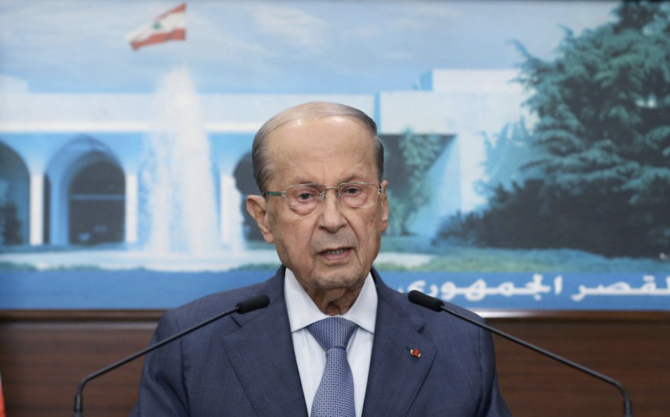٣ اصلاحات دستورية ضرورية وغير معقدة : انتخاب سن ال ١٨ فصل النيابة عن الوزارة اعادة صلاحية تفسير الدستور الى المجلس الدستوري كما نص الطائف. حاولت ولم انجح ، وهناك اصلاحات اخرى مهمة ينبغي مناقشتها وقد تكلمت عنها مرارا
by english.aawsat.com — Lebanese Forces Leader Samir Geagea has criticized the military judiciary and accused it of aligning with Hezbollah. Earlier this week, Geagea was summoned for questioning over street tension that erupted on Oct. 14 during a rally called for by Amal movement and Hezbollah to demand the removal of Tarek Bitar, the judge […]

President Michel Sleiman: ان تقريب موعد الانتخابات هو امر دستوري ١٠٠/١٠٠،
By NAJIA HOUSSARI — arabnews.com — BEIRUT: Lebanese President Michel Aoun has sent a law amending legislative election rules back to parliament for reconsideration, the presidency said in a statement. Aoun did not sign the law, to which parliament introduced some amendments. He has requested that these amendments be reconsidered. Aoun’s objection comes after the Free Patriotic Movement bloc raised its opposition to holding elections in March instead of May because it “narrows its margins of action.” During the legislative session of Oct. 19, the bloc also objected to proposals to change the expatriate voting formula by canceling the six allocated seats and allowing expatriates to vote for the electoral lists. The FPM sought to allocate these six seats in the electoral law, provided that voting for these representatives would take place in the 2022 elections. Parliament Speaker Nabih Berri called on the parliamentary committees to convene next Tuesday to discuss Aoun’s response to the electoral law. Observers described these developments as a sign of a political struggle for the presidency. The parliament to be elected in March is expected to pick the new president after Aoun’s term ends in October.
In the decree in which he requested a review of the amendments, Aoun said that “shortening the constitutional deadline for the elections could prevent voters from being able to exercise their electoral right due to the natural and climatic factors that often prevail in March, making it impossible for voters to reach their polling stations, not to mention the cost of transportation and the inability to supply polling stations with electricity.” He added: “This could also prevent voters residing outside Lebanon from exercising their political right preserved in the current electoral law by voting for their representatives in the electoral district designated for non-residents.” The president said that the amendments to the law deprive the right to vote from 10,685 citizens, who would reach the age of 21 between Feb. 1 and March 30, 2022. Zeina Helou, an elections expert, told Arab News: “Aoun is trying to pull strings in order to later accuse the other political parties of preventing him from carrying out the reforms he wanted.” She added: “Aoun and his political team prefer to gain more time to conduct the elections rather than move the date up. “Freezing the voter lists will deprive new voters who would soon turn 21 from the right to vote, and this may be a reason to appeal before the Constitutional Council.”
سليمان: ضغط سياسي هائل على الجسم القضائي وطنية – استقبل الرئيس العماد ميشال سليمان في دارته في اليرزة، وفدا من “الجبهة السيادية من أجل لبنان”.وشدد سليمان أمام الوفد على “أهمية رص الصفوف السيادية للحؤول دون تغيير وجه لبنان ومنع انسلاخه عن محيطه العربي”، داعيا إلى “ضرورة تطبيق الدستور وتحصينه من خلال تحييد لبنان […]
NNA – The press office of State Prosecutor Ghassan Oueidat on Friday denied news claiming that he had frozen the decision of the government commissioner before the military court, judge Fadi Akiki, to hear the testimony of Lebanese Forces party leader, Samir Geagea. “The news are untrue,” Oueidat’s office said, explaining that judge Akiki received […]

By NAJIA HOUSSARI — arabnews.com — BEIRUT: Struggling to cope with soaring living costs and low wages, desperate Syrian refugees and workers are abandoning Lebanon and turning to a new migration route into Europe, via Belarus, with many risking their lives and family savings in the process. An illegal Syrian worker who arrived in Beirut four years ago and lives with his 20-year-old sister in the capital told Arab News that “working in Lebanon no longer makes sense.” “I work all day long delivering goods to be paid 50,000 Lebanese pounds (equivalent to $2.50 on the black market),” Ahmed said. “That is not nearly enough because of the rising costs.” In the past two months alone, more than 16,000 undocumented migrants are believed to have entered the EU from Belarus after Belarusian President Alexander Lukashenko responded to Brussels-imposed sanctions by saying he will no longer stop asylum-seekers from crossing into neighboring Poland.
Belarus has been accused of offering migrants tourist visas and helping them across its border — a move that appears to have made the previous migrant route through Turkey and on to the Greek islands a thing of the past. Arab and foreign airlines arranging trips to Belarus through Lebanon have seen demand surge since September, while Syrians have been queuing outside the General Directorate of Public Security’s offices in Beirut for hours to have their passports returned or to pay residency fees. Lebanese citizens can obtain a visa for Belarus once they arrive at Minsk airport. However, Syrians, Iraqis and Palestinians are required to get a tourist visa in advance. Ahmed told Arab News that he found a video on TikTok of Syrians talking about their trip to Belarus, then Poland and finally to Germany, and claiming that the journey is less risky than traveling by sea. “I am now getting my documents ready to leave before the end of October, because things will not get easier after that because of the conditions in winter,” he said.
lb.usembassy.gov — On October 22, Ambassador Dorothy C. Shea attended the inauguration of the Pop-Up Spaces program in Saida. This one year-long program, which is implemented by Tatweer Baladna, will empower youth and young professionals in South Lebanon, North Lebanon, and the Bekaa through civic education and social entrepreneurship training and hands-on activities. During the […]
ان تقريب موعد الانتخابات هو امر دستوري ١٠٠/١٠٠، في حين ان وضع المجلس الحالي هو مخالف للدستور لانه لم يتم انتخاب بدلاء عن النواب المستقيلين والمتوفين وفقاً لمنطوق المادة ٤١ من للدستور . كذلك مساواة المنتشرين بالمقيمين في العملية الانتخابية هو مطابق للدستور. أوضاع لبنان والحكومة بين ميقاتي وسليمان زار رئيس مجلس الوزراء نجيب ميقاتي […]
by middleeasteye.net — Samir Geagea, head of the Lebanese Forces (LF), a Christian party, has been summoned for questioning over deadly violence that erupted at a protest last week, a judicial official said on Thursday. Fadi Akiki, a representative of the military court, had “instructed the army intelligence to summon Geagea and take his statement based on information provided by arrested LF members”, the official said. Seven people were killed last week when a gun battle erupted as protesters from the Hezbollah and Amal groups were on their way to demonstrate against the lead investigator of the Beirut port blast, Tarek Bitar. The majority of those killed were members of Hezbollah and Amal, who accused the LF of being responsible for sniper fire against the protesters that ignited street clashes, charges Geagea rejects.
Twenty-six people were arrested after the violence in the heart of the Lebanese capital, most of them LF members, the official said on Thursday. Geagea has denied responsibility for the deaths, saying that residents of Beirut’s Christian neighbourhood of Ain al-Remmaneh had “defended” themselves against “Hezbollah militiamen who tried to enter their homes”. On Thursday, Geagea told Lebanon’s MTV channel that he was not informed of any request to hear his statement on last week’s violence and added that his group does not have any armed fighters. “I am ready to appear before the judge, on one condition: that Hassan Nasrallah does it before me,” he said. Hezbollah chief Hassan Nasrallah on Monday launched a scathing attack against the LF leader, saying that his movement had 100,000 armed fighters at its disposal, and warned it against sparking any “civil war”. He has been in hiding since the war between Hezbollah and Israel in 2006.

إنَّ بلدًا تقفُ الحربُ الأهليّةُ خلفَ بابِه ليس بلدًا قابلَ الحياة. إن شعبًا يَتعرّض فيه كلُّ جيلٍ من أجيالِه لتجربةِ الدمِ حريٌّ به البحثُ عن مصيرٍ آخَر. إن مجتمعًا يسيرُ عكسَ حركةِ التقدّمِ والتاريخِ يَلفِظُه الحاضرُ والمستقبل. إنَّ نظامًا مركزيًّا يَفرِزُ الفتنَ دوريًّا ليس نظامًا مناسبًا. إنَّ دولةً لا تَحمي شعبَها هي دولةٌ فاشلة. إنَّ تعدُّديّةً تَفتقِر إلى الحضارةِ المتوازيةِ وثقافةِ السلام هي مصدرُ اقتتالٍ موسِميّ. إنَّ مكوّناتٍ لا يتضامنُ بعضُها مع البعضِ الآخَر لا تحترمُ بديهيّاتِ الشعورِ مع الشريكِ الآخر.
أحداثُ 14 تشرين الأوّل وخِطابُ السيد حسن نصرالله وما تَبِعهُما من مواقفَ ملتَبسةٍ ومتقلِّبةٍ وذِميّة، أيْقظَت هذه المعطياتِ القديمةَ/الجديدة، وأكّدَت، مرّةً أخرى، استحالةَ البقاءِ في ظلِّ دولةٍ مركزيّة. ما تَصوّرتُ يومًا أن يُهدِّدَ السيّدُ نصرالله المسيحيّين اللبنانيّين بذاتِ المنطقِ العَدائيِّ الذي يُهدِّدُ به إسرائيل. يَتوعَّدُ إسرائيلَ بمئةِ ألفِ صاروخٍ، والمسيحيّين بمئةِ ألفِ مقاتل. إشكاليّةٌ هي توحيدُ الأرضِ والشعبُ منقسِمٌ، ومأساةٌ هي تقسيمُ الأرضِ الوطنيّةِ بسببِ انقسامِ الشعبِ لدَواعٍ غيرِ وطنيّة. عِوضَ أن يكونَ التقدّمُ في الزمنِ تَقدُّمًا في تثبيتِ دولةِ لبنان، أخَّرَها. وعِوضَ أن تكونَ المحنُ عِبرةً تَختِمُ حروبَنا بالشمعِ الأحمرِ، بَقيت مفتوحةً وتَفنَّنا في إعادةِ إنتاجِها. غريبٌ هذا الوطنُ الذي نَشأ للكلمةِ ولا يَحتكِمُ إلا للسلاح، وتأسَّسَ للتوافقِ فصارَ بئرَ أحقاد. نحتاجُ هيئةً لمكافحةِ الأحقادِ أكثرَ من هيئةٍ لمكافحةِ الفساد.



